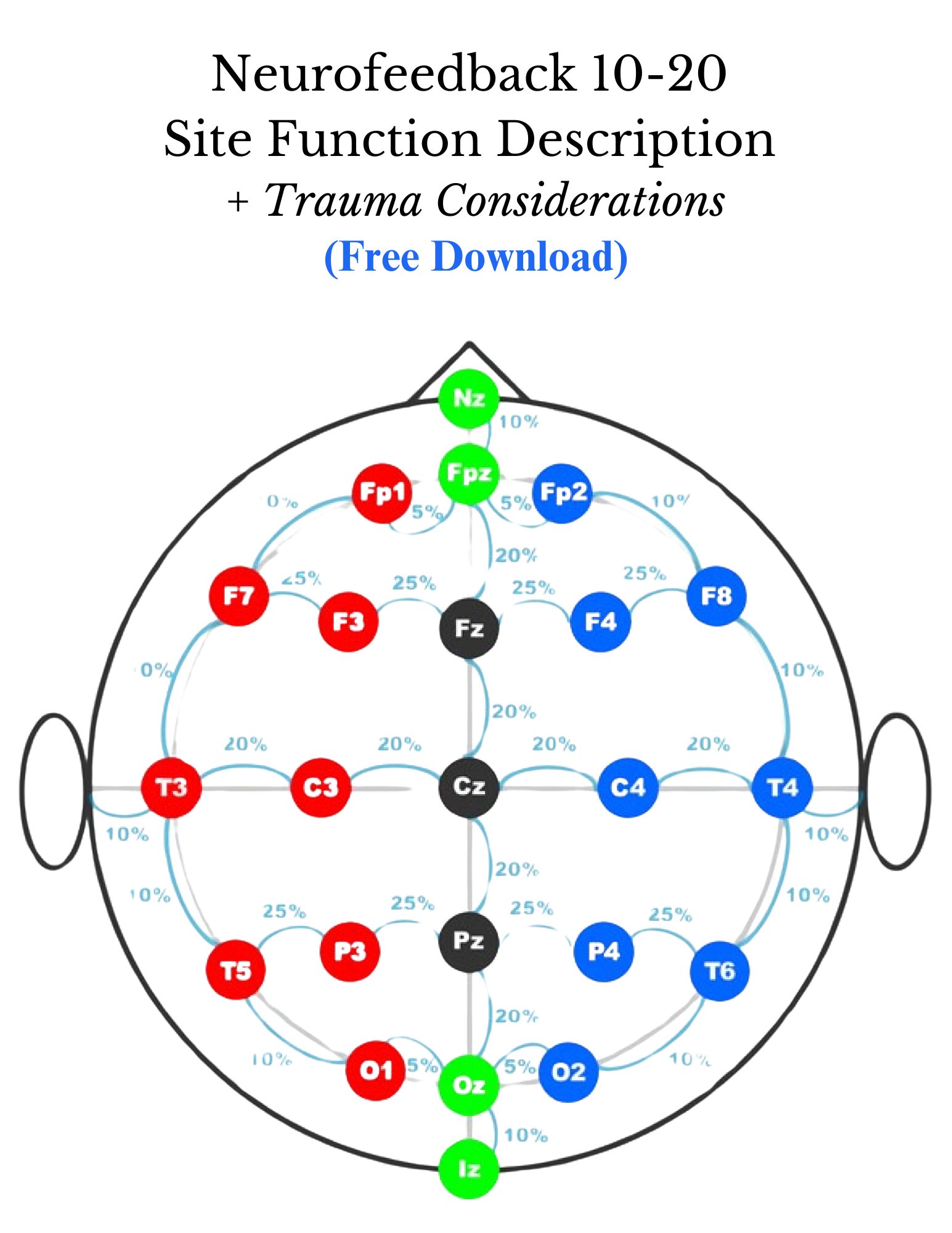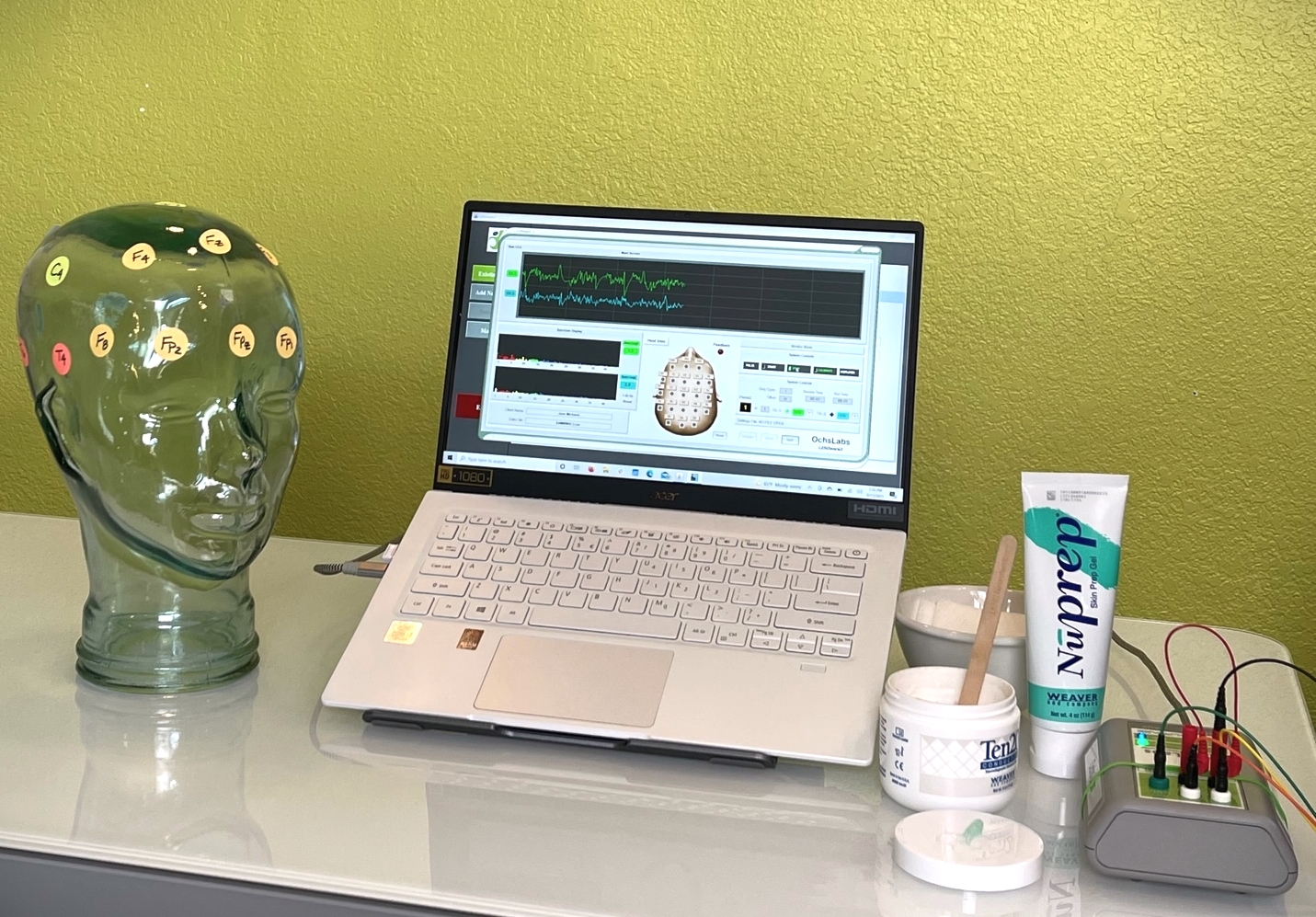Neurofeedback
heal psychotherapy - in-person and virtual Therapy
Measured, Non-Invasive, Neuroplasticity in Real-Time!
We offer evidence-based neurofeedback with the latest FDA cleared technology!
"If you want to find the secrets of the universe, think in terms of energy, frequency and vibration."
— Nikola Tesla
Subscribe to learn more about new services and FREE e-book releases!

Free Neurofeedback 10-20 Site Description PDF
Download our essential 10-20 System Site Functionality Guide now.
This guide will support you as you develop your skills as a neurofeedback practitioner. Download it to increase your understanding of brain functionality and protocol development.
*Note that when you download this free guide, you understand that we will keep your information confidential and may email you in the future with other helpful resources.
We respect your privacy and will never share your information.
What is Traditional Neurofeedback & How Does it Work?
What is happening during a Neurofeedback session?
Through EEG technology, your brainwaves will be seen on a monitor. On a separate monitor, you will watch your own brain activity shown through animations (for example, see the photo below).
Your brain will experience rewards and inhibits through animations. This process will teach your brain how it can work at its fullest capacity. In other words, the brain knows it’s looking at itself and learns how to “untangle” rut patterns that are perpetuating symptoms.
In traditional neurofeedback, nothing is added to the brain. Instead, through operant conditioning, the brain learns its custom process for optimizing. This is a natural neuroplastic process; it is neuroplasticity in real time! Your brain will strengthen existing functioning, and it will learn to improve the weaker (or stuck) waves that are causing imbalances and concerning symptoms.
Neurofeedback is fun and safe for all ages. It does not make every brain and nervous system the same; it targets each person’s unique needs to support their optimal functioning.

Traditional Neurofeedback is non-invasive, natural, and assists people with:
- Athletic Performance Enhancement (junior athletes to Olympians)
- Trauma (Developmental/Childhood and Acute)
- Addiction (Alcohol, Cannabis, Compulsive Sex, Gambling, etc.)
- ADHD/ADD
- Migraines
- Mood Disorders
- Loss of Identity, Impaired Sense of Self, Dissociation
- Obsessive Compulsive Disorders
- Depression
- Seasonal Affective Disorder (SADs)
- Insomnia
- Anxiety and Panic Attacks
- Nervous System Dysregulation
- Schizophrenia
- And much more!
Bessel van der Kolk on Using Neurofeedback to Change the Brain
Trauma-focused neurofeedback is a cutting-edge therapeutic approach that supports neuroplasticity in real time!
Here are some compelling reasons why trauma-focused neurofeedback is worth considering:
Targeted Healing for Trauma: Trauma-focused neurofeedback is specifically designed to address the effects of trauma on the brain and nervous system. Traumatic experiences can lead to dysregulation in neural pathways, causing symptoms like anxiety, depression, PTSD, and difficulty coping with stress. Neurofeedback aims to restore balance and functioning in these areas.
Non-Invasive and Drug-Free: Unlike some traditional treatments, trauma-focused neurofeedback is non-invasive and does not involve medication. It utilizes advanced technology to monitor brainwave activity and provide real-time feedback, helping the brain to reorganize itself from the trauma’s neuronal impacts.
Individualized Treatment: Every person’s brain is unique, and trauma affects individuals differently. Trauma-focused neurofeedback is personalized to each individual’s brainwave patterns, allowing for tailored treatment plans that cater to specific needs and responses.
Efficient and Lasting Results: Neurofeedback has been shown to offer rapid and enduring results for trauma survivors. Clients often report reduced symptoms, improved emotional regulation, better sleep, and enhanced overall well-being.
Complements Other Therapies: Trauma-focused neurofeedback can be used as a standalone treatment or as a complementary approach alongside other therapies, such as psychotherapy or counselling. It enhances the effectiveness of other treatments by supporting the brain’s capacity for healing.
Neuroplasticity and Brain Healing: The brain’s remarkable ability to reorganize and form new neural connections is called neuroplasticity. Trauma-focused neurofeedback harnesses this process to promote brain healing and resilience after trauma.
Empowerment and Self-Regulation: Neurofeedback empowers individuals by teaching them self-regulation skills. Clients can experience a renewed sense of control over their emotional and physiological responses, leading to increased self-confidence. They can experience life outside of “surviving.”
Safe for All Ages: Trauma-focused neurofeedback is safe and suitable for individuals of all ages, from children to older adults. It can be particularly valuable for children who have experienced trauma, as it may help prevent the development of long-term emotional and behavioural difficulties.
Reduced Risk of Relapse: Neurofeedback addresses the underlying neural imbalances associated with trauma, reducing the risk of relapse and promoting sustained recovery.
Scientific Support: Trauma-focused neurofeedback is backed by an increasing body of scientific research supporting its effectiveness for trauma treatment. As the field of neuroscience advances, so does our understanding of how neurofeedback can be harnessed to facilitate healing.
It’s important to note that trauma-focused neurofeedback should be administered by qualified and experienced professionals, such as licensed therapists or clinicians trained in neurofeedback techniques. If you or someone you know is struggling with trauma-related symptoms, consider connecting with Lucie Ritchie to explore trauma-focused neurofeedback as a potential path to healing and recovery.

Where has Neurofeedback been Implemented?
Neurofeedback is used by mental health clinicians, psychiatrists, neurologists, and occupational therapists to name a few. Neurofeedback has also been implemented within a wide range of settings across the globe, including:
Community mental health programs
Private practice, clinics, and hospital settings
Veterans services
School special education services
Substance abuse programs
Foster care programs
Programs for recently released prisoners
Programs serving the homeless
Programs serving battered women
Drug courts
Domestic violence programs
Family and couples therapy
Traditional Neurofeedback Research
Nicholson, AA., Ros T., Jetly R., Lanius, RA., (2020) Regulating Posttraumatic Stress Disorder Symptoms with Neurofeedback: Regaining control of the Mind. Journal of Military, Veteran and Family Health, 6(S1), 3–15.
Rogel, A., Melville, A., Suvak, M., Hamlin, E., Hodgdon, H., & Van der Kolk, B. (Submitted). The impact of Neurofeedback Training on Children with developmental Trauma: A Randomized Control Study.
